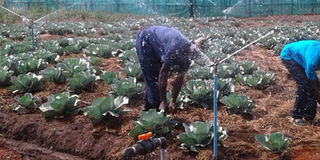Increase irrigation points, World Bank advises government

Irrigation. Farmers irrigate a cabbage garden in Gawa Village, Kobwin Sub-county in Ngora District, on November 9. The World Bank has made four recommendations to government to help improve the agriculture sector. PHOTO BY FRED WAMBEDE
What you need to know:
Tasked. Government has also been tasked to ensure farmers have better access to markets.
The World Bank has made four key recommendations it says will help improve Uganda’s agricultural sector that is staggering to register growth.
The recommendations which are part of the reports released recently by the World Bank include improvement of quality of inputs and transferring quality knowledge to farmers, increasing availability of irrigation so that less of the country is dependent on rain for agriculture.
Others are that government and development partners ensuring that measures are undertaken for farmers to have better access to markets in order to get better prices for their goods, and ensuring regulation, supporting appropriate research and extension services.
The report released on Tuesday at the launch of the 12th Uganda Economic Update at Gulu Country Diary Farm indicates that despite the country’s growing economy, the agricultural sector has been performing poorly.
According to the report, Uganda’s GDP has rebounded strongly to 6.1 per cent in Financial Year 2017/2018, from 3.9 per cent the previous year.
Mr Antony Thompson, the World Bank Country Manager, said the agricultural growth on average for the past 15 to 20 years has been running at 2.5 per cent per annum compared to population growth which is at 3 per cent per annum.
“When you compare Uganda to other countries, the agricultural sector in those countries is developing much faster, we see that this is pointing to a problem; Ugand’s agriculture is not fulfilling its potential,”
Mr Thompson said the World Bank key recommendations if implemented will in the long run turn around the agriculture sector and make it more profitable to the more than 70 per cent people it employs.
“We shall actually see huge potential to boost growth in agricultural sector in a more sustained way. Given that Uganda agriculture is characterised by small farmers, this means that the ordinary Ugandans with small farms will be the beneficiaries of this kind of investment,” Mr Thompson said.
The Minister for Agriculture, Animal Industry and Fisheries, Mr Vincent Bamulangaki Sempijja, who presided over the launch of the report, acknowledged that the country’s agricultural sector is not performing well but said government is doing its best including increasing funding to improve the sector.
Government plans
Mr Sempijja pointed to climate change as one of the challenges that is affecting the sector. To fight this, he said, government is planning to increase irrigation points for farmers next year.
He, however, noted that for agriculture to be viable, farmers ought to add value to their crops to earn more money.
The former Gulu University Vice Chancellor, Prof Jack Nyeko Pen-mogi, said poverty in the north is attributed to the growth of crops that do not have market values.
A World Bank report released early this year also indicated that Uganda loses between 4 and 12 per cent of GDP due to inefficiencies in the agricultural sector.
“If the region is to progress, farmers should move away from growing of cereals such as maize, sorghum to perennial crops like coffee and vegetables,” he said.



